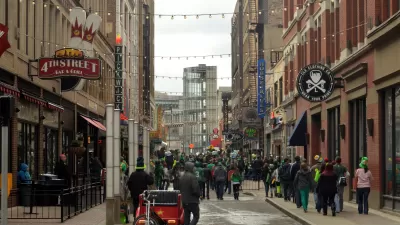A new report released this week seeks to address whether the "urban health advantage" can be extended to more of the world’s population as cities continue to grow in the coming decades, reports Katherine Harmon.
While cities are thought to be an overall aid to general health due to better access to health care and improved overall infrastructure, it takes good planning to ensure that potentially harmful effects are minimized. Lessons of good planning practices will become increasingly important as the world, and especially the developing world, continue to urbanize.
That is the impetus behind a new report authored by Yvonne Rydin, of the University College London's Bartlett School of Planning, and published this week that, "examines several initiatives across the globe-from providing gardening
plots to urban residents in Cuba, to improving the pedestrian experience
in Bogota, Colombia-to see what's working and how we can best prepare
for continued urban growth."
"The authors conclude that urbanization alone will not automatically help
everyone lead healthier, happier lives," writes Harmon. "To improve the health of all urban dwellers-present and
future-concerted planning will be necessary, but global payoffs will be
great."
FULL STORY: Can the “Urban Advantage” Bring Better Global Health as City Populations Skyrocket?

Planetizen Federal Action Tracker
A weekly monitor of how Trump’s orders and actions are impacting planners and planning in America.

San Francisco's School District Spent $105M To Build Affordable Housing for Teachers — And That's Just the Beginning
SFUSD joins a growing list of school districts using their land holdings to address housing affordability challenges faced by their own employees.

The Tiny, Adorable $7,000 Car Turning Japan Onto EVs
The single seat Mibot charges from a regular plug as quickly as an iPad, and is about half the price of an average EV.

As Trump Phases Out FEMA, Is It Time to Flee the Floodplains?
With less federal funding available for disaster relief efforts, the need to relocate at-risk communities is more urgent than ever.

With Protected Lanes, 460% More People Commute by Bike
For those needing more ammo, more data proving what we already knew is here.

In More Metros Than You’d Think, Suburbs are Now More Expensive Than the City
If you're moving to the burbs to save on square footage, data shows you should think again.
Urban Design for Planners 1: Software Tools
This six-course series explores essential urban design concepts using open source software and equips planners with the tools they need to participate fully in the urban design process.
Planning for Universal Design
Learn the tools for implementing Universal Design in planning regulations.
Smith Gee Studio
City of Charlotte
City of Camden Redevelopment Agency
City of Astoria
Transportation Research & Education Center (TREC) at Portland State University
US High Speed Rail Association
City of Camden Redevelopment Agency
Municipality of Princeton (NJ)




























